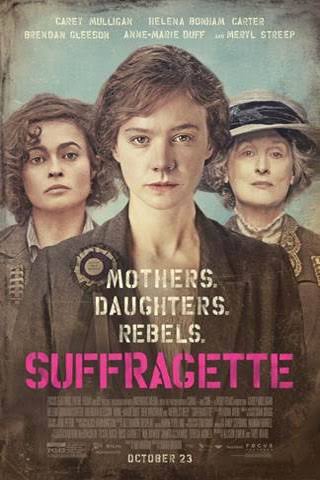Originally published September 4, 2016
This is NOT a blog about who to vote for. I do NOT expect to change people’s minds on whether or not they should vote for any specific candidate. What I DO wish to accomplish is to provide food for thought. If there are races in which you feel compelled to withhold your vote, I want you to find the ones you can commit to. Somewhere, there is a race that you can research, that you can determine a choice, I don’t care if it is the local dog-catcher. It’s a long term plan, people. But if we don’t start now…
I have been wanting to write a blog about voting for some time now. Problem is, the history of voting might require something of a tome and that is not what blogs are for. The best way to say what I feel is important is to choose some aspect of that history and go from there. I chose the movie Suffragette as a starting point for a number of reasons that will become clear.
According to the Washington Post, the movie is based on some of the historical elements of the struggle British women faced in and about 1912-1913. Definitions are in order, a Suffragette is a member of the suffrage movement that advocated action, often involving violence of some kind. A Suffragist was a member of the National Union of Women’s Suffrage Societies and they advocated using the political and social system to achieve their goal. Although the Suffragettes brought much needed attention to the issue, it was the latter organization that finally won the vote for British women in 1918. The Union’s membership included men who were of the opinion that it was far past time to involve the other half of humanity in the process of governing the people. Why?
In the early 1900s a woman in British society rarely had the barest of rights. Her employer controlled her from the time she began work (usually in her teens) until she died. It was not uncommon for these men to demand personal service as well as that required in the factory. A woman had no right of consent over her children. Should her husband dismiss her, their children were his to do with as he pleased, including surrendering them for adoption. Many women were abused. They had no avenue of regress. On the other side of the coin, persons who hold the right to define government have difficulty equating those who don’t as equals: whether the difference is gender, or race. Women were, in large part, merely possessions; whatever made them think they had the cognitive ability to vote?
It was not until August 18, 1920, that the United States followed Britain by ratifying the 19th Amendment to the Constitution. This was a long battle that became a more organized effort as early as 1848 when women’s suffrage was organized at the national level by Elizabeth Cady Stanton and Lucrecia Mott. Included in their platform (as it was in Britain) was the right to better opportunities for women in education and employment. This was no light undertaking. Women, and men, died to support the effort. Some in prison, some in riots or protests. Some women were simply beaten by the men in their lives.
After a great deal of sacrifice, the movement began to have success at the state level as Alaska (Territory), Arizona, Arkansas, California, Illinois, Indiana, Kansas, Michigan, Montana, Nebraska, Nevada, New York, North Dakota, Oklahoma, Oregon, South Dakota and Washington all established suffrage for women between 1910 and 1918.
Another long battle ensued in the United States over the voting rights of blacks. It was not until the signing of the Voting Rights Act of 1965 that the right to vote was secured by law. There are still legal battles that include practices such as gerrymandering, various levels of testing, and onerous forms of identification. Voting is not a settled matter in this country; those who wish to take responsibility for the selection of the government and the manner in which they govern still have a fight.
Why is this all so terribly important? There are many forms of the thought that a people deserves the government they receive. In some ways this is not true. Once a ruling class is established, the fee to join the club is usually beyond the common person and, therefore, not as easily changed by those with vision. However, there is a piece of the puzzle that does fall within the control of every-day folk. It starts at the local level.
The people we see in power today did not start there. In most cases, their career started at the local level as a council-person, a mayor, a local representative, or a state elected official. Rarely does a candidate come out of the clear blue with no public service background. The way to change the available choices is to begin at that level where you can have a personal connection with the individual and truly assess what they can contribute to the community as a whole. It comes from watching how they handle what is happening in your community and how they represent the interests of those that depend on them.
I sincerely want people to vote their conscience—really. But I also want them involved. If you don’t like the way your preferred party selects candidates: be part of the change. If you are frustrated with the choices: think about being one yourself, or banding with others to encourage someone you think would be a good choice. Become involved in your destiny; participate in the process that impacts your life. Too many people have given too much for the privilege; don’t throw it away.


No Comments